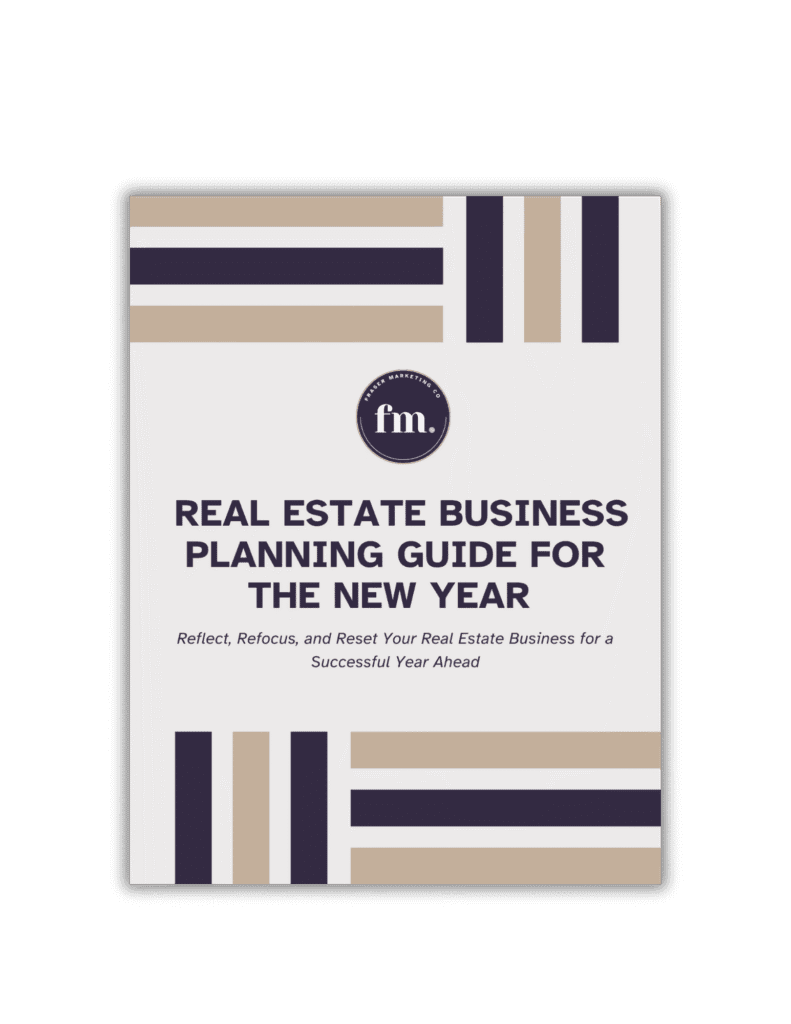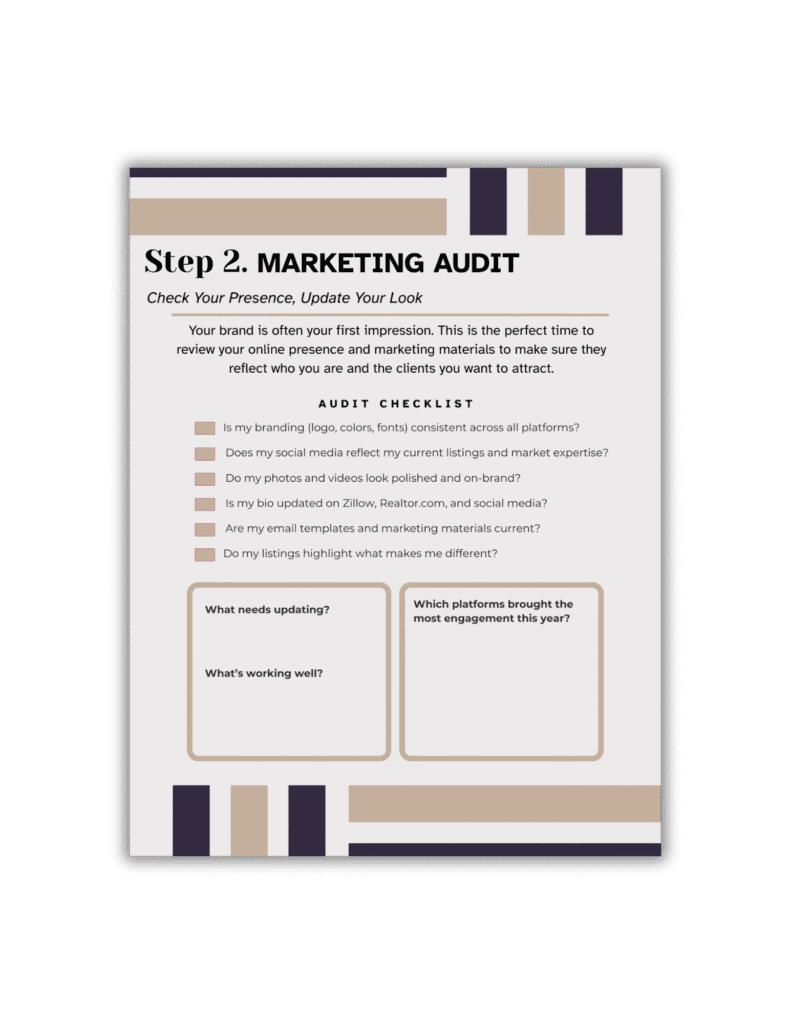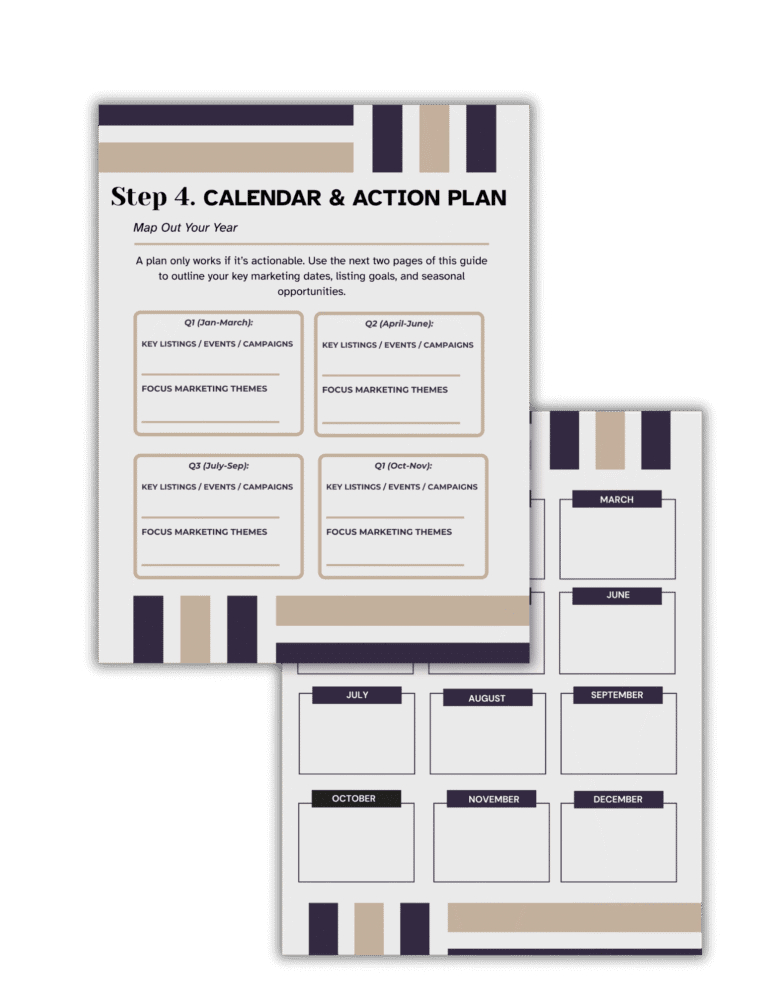With 2025 coming to a close, I’ve been reflecting on the marketing strategies we’ve used this year to help our thousands of Realtor clients. My job as a Real Estate Marketing Specialist is to figure out what worked, what didn’t, and come up with a plan for how we can continue doing our best work to help real estate agents grow their businesses in 2026.
We spent 2025 focusing on providing courses, free resources, membership plans, social media templates, and e-flyers to our Realtors, and monitoring which marketing strategies work best for them. That being said, I’m dropping all the info we learned, and how I would create a real estate business plan for the upcoming year!

Why Year-End Planning Matters as a real estate agent
Year-end planning is essential for realtors to evaluate what worked in their business over the past year, create a budget for the upcoming year, and set clear goals and systems for an optimal business model. Year-end planning also includes updating your CRM, reaching out to past clients, sending thank-you gifts, and most importantly creating a strategic business plan for the year ahead. I consider this one of the most important tasks for Realtors in quarter four, unfortunately, it can be overwhelming, so it’s often overlooked.
That’s why I created a step-by-step Real Estate Business Plan Guide for Realtors, I truly believe that any realtor who takes the time to focus on this crucial step in October through December can set themselves up to drive better business results in the year ahead. You can download the guide (for free) by clicking the button below!
Grab Your Free 2026 Real Estate Business & Marketing Planning Guide
Plan your year like a pro! Enter your email to get your step-by-step guide to reflect, set goals, and grow your business in 2026.
Thank you!
You have successfully joined our subscriber list.
Step 1: Reflecting on the Year & What I'VE LEARNED from 2025's real estate marketing data
The first step of your Real Estate Business Plan is actually pretty simple. Ask yourself a few simple questions, and write down your answers to reflect on how your real estate business did in the past year.
- Which campaigns generated leads and conversions?
- Which strategies underperformed and why?
- What lessons did you learn that can inform next year’s marketing plan?
Since my job involves working with many many realtors, I took extra time on this step to evaluate the marketing trends & campaigns that were successful for my clients. Here’s what I learned:
- E-flyer’s always have been and still were in 2025 our most successful way of marketing our clients listings, and helping them attract buyers/sellers. Trending Reels & Tiktok videos proved to be a successful way for our Realtors to grow their businesses rapidly, but only if they were consistent with posting.
- Strategies that underperformed for our clients this year were outdated “just listed” and “just sold” social media graphics. As well as putting too much emphasis on having a website & not enough focus on social media.
- This year we learned that with the increasing use of social media, Realtors could see the most rapid growth results by shifting their focus from traditional real estate marketing strategies to establishing themselves as a “local expert” on various social media platforms, and nurturing the relationships they have with past clients to increase referrals.
Step 2: create a marketing & branding audit for the previous year

I know this step sounds complicated, but it’s really not. To perform a marketing audit, just look over the previous marketing strategies you used and ask yourself which ones are bringing in the most ROI (Return on investment). Whichever strategies did not bring you new clients, I would abandon in the new year. Our Free Real Estate Planning Guide includes all the questions and prompts you need, with space to fill everything out in one place so you can stay organized and refer back whenever you need.
As far as branding goes, you want to make sure your branding is up to date, modern, aesthetically appealing, and fresh. Unfortunately, our current society relies heavily on aesthetics. Make sure your logo looks modern and visually appealing. Make sure your listing photos are not grainy & pixelated. For 2026 try to stick with consistent, modern, and beautiful branding for all of your real estate marketing materials.
If you don’t know where to start, we offer a custom brand kit service, where we work with you to create a brand that is not only sophisticated, modern & beautiful, but also feels like you.
step 3: planning for 2026 and setting smart goals
When we sit down with clients, we start by looking back at what worked last year. Did your social media bring in quality leads, or did most of your business come from referrals? Did you invest time in video content, email marketing, or events, and if so, which actually converted? Once you identify those patterns, you can build your new year goals around them.
For example, if you noticed consistent engagement from your Instagram Reels or market update posts, that’s a clear sign to double down on video content next year. If most of your deals came from repeat clients, your goal might be to build a stronger client appreciation system or automate follow-ups in your CRM.
Here’s how I usually recommend structuring these goals:
Start with three key categories: business growth, marketing visibility, and client relationships.
Set SMART goals (Specific, Measurable, Achievable, Relevant, Time-bound) for each one.
Break them into quarterly milestones — that way, you can track progress and adjust throughout the year instead of scrambling next December.
One of our realtor clients followed this exact approach last year. She realized most of her leads came from social media but wasn’t posting consistently. We built a quarterly plan around content themes and scheduled everything in advance. Not only did she double her engagement by March, but she also had her best listing season to date, simply because her marketing plan aligned with her business goals.
Year-end planning gives you the space to be intentional about where your energy and budget go next year. It’s not about doing more, it’s about doing what works, and doing it better.
Step 4: Calendar & Action Plan
Once you’ve reflected, set goals, and updated your marketing plan, it’s time to put it all into action. I always recommend creating a simple calendar to stay on track. You don’t need anything fancy. Just a clear timeline for what needs to happen through out the year. Start by blocking time for the essentials: updating your CRM, sending client gifts, reviewing your budget, and setting next year’s marketing themes. From there, map out key dates for Q1. things like social media campaigns, local events, listing launches, and holidays you can plan content around.
The goal is to head into the new year with clarity, not chaos. A written plan gives you direction, helps you prioritize, and keeps your marketing consistent when business picks up again after the holidays.

Bonus Tips for Success: Client appreciation
One thing I’ve noticed over the years is that the realtors who stay connected with their past clients always see the best results. A simple thank-you card, pop-by gift, or quick check-in goes a long way in keeping your name top of mind.
This time of year, we help many agents plan small gestures that feel personal. Things like handwritten notes, local treats, or a branded holiday card. It’s not about spending a lot; it’s about showing genuine appreciation.
Last year, one of our clients sent handwritten notes to everyone she’d helped buy or sell a home. By January, she’d already received three new referrals, all from people who said her note stood out.
People remember how you make them feel, and when your making your business plan for the new year, it is the perfect time to remind your clients why they chose you in the first place.
